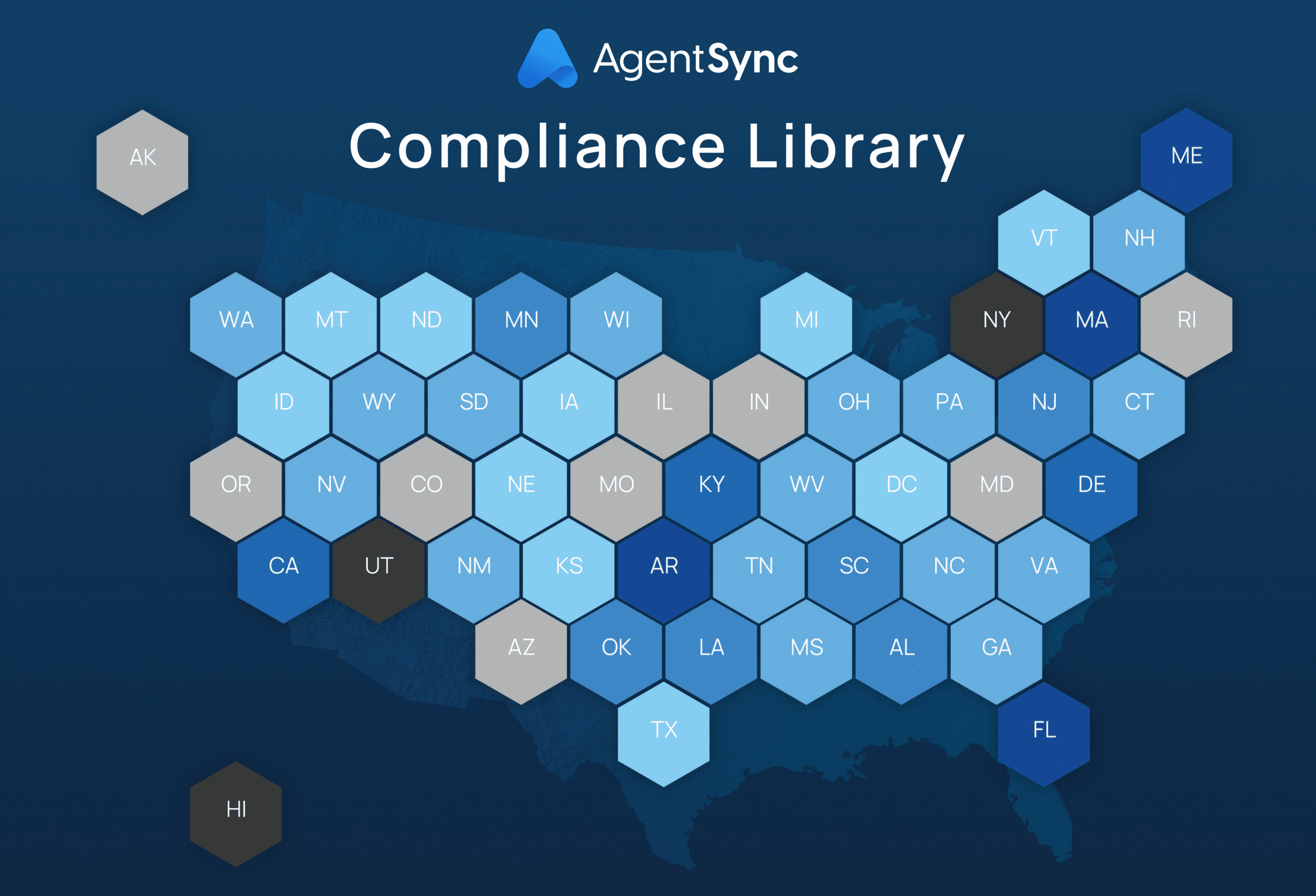

State-by-state variations of laws, compliance protocols, industry transparency, and general regulatory culture can lend one the impression that keeping up with industry changes is a little bit like herding cats. So, what better way to wrangle some of the more localized insurance news than in a Regulatory Roundup?
On an ongoing basis, in no particular order or rank, we’re wrestling the various regulatory changes, compliance actions, and commissioner decisions into our roundup. As a disclaimer: There’s a lot going on at any given time in these here United States, so this isn’t a comprehensive picture of state-level action by any means. Think of it, instead, as a sampler platter of regulation.
Also important to note: If we’re recapping interpretations of legal decisions, this is some armchair insurance speculation and not at all legal advice. If you need legal advice, get a lawyer.
North Carolina warns insurers about hurricane denials
On the heels of Hurricanes Helene and Milton, North Carolina Insurance Commissioner Mike Causey reminds insurers in the state about an important and applicable part of the law.
Consumers who carry flood insurance through the National Flood Insurance Program (NFIP) are required as part of their policies to first file a claim with their homeowners insurance and receive a denial of coverage before then filing a claim with their NFIP policy.
Because of this requirement, North Carolina homeowners will be filing numerous claims fully knowing they’ll be denied. In other circumstances, a denial of coverage might lead an insurer to make underwriting decisions such as raising rates or nonrenewing a policy, but Commissioner Causey reminds insurers in the state that the law prohibits them from doing so in these cases.
According to a press release from the North Carolina Department of Insurance:
“Please be advised that insurers should not take underwriting actions, such as consent to rate adjustments or policy modifications, in response to flood-related claims or inquiries on homeowner’s insurance policies when no coverage exists.
“Taking underwriting action in response to requests for these letters unfairly penalizes policyholders who are seeking only to confirm the lack of coverage and may be in violation of N.C. Gen. Statute 58-36-115.”
For insurers outside North Carolina, other states may have similar laws, so it pays to be cautious about taking action on policies when an insured is filing a claim to receive denial as part of the process for filing claims with another insurer, such as NFIP or other standalone flood or wildfire insurance.
More insurance fraud, more arrests
Is insurance fraud on the rise? It might feel like it when you look at the most recent editions of the Regulatory Roundup! Yet again, we’ve got cases of insurance fraud to report. This time, from an insurance policyholder as well as from those working as unlicensed contractors in Florida, following Hurricane Milton.
In North Carolina, a 29 year old woman from Onslow County was arrested on charges of felony insurance fraud. Alexis Camrey Washington Thompson allegedly filed renters insurance claims with her carrier, Markel American Insurance Co., claiming items had been stolen from her apartment. In reality, the Department of Insurance alleges, Thompson simply sold the items and was trying to get even more money by claiming theft under her renter’s insurance policy.
In Florida, detectives arrested more than 60 individuals near Madeira Beach who claimed to be licensed contractors, but were in fact, not. A large-scale undercover sting operation found 62 people who had performed at least 75 projects, totaling $250,000. It’s unknown whether these “contractors” planned to collect money from clients’ insurance companies for the work they performed, but since they weren’t legally licensed to perform that work in the state, this could leave consumers with major bills they can’t get reimbursed for.
Reminders and new rules for Pharmacy Benefit Managers (PBMs)
Pharmacy Benefit Managers play a major role in the U.S. healthcare system by acting as intermediaries between pharmaceutical companies, pharmacies, insurance plans, and consumers. In some cases, PBMs are entirely independent, while in other cases, health insurance companies own them. In some situations, health insurers may “perform the role” of a PBM. Regardless of those complexities, states have been issuing reminders and releasing new rules for PBMs and anyone acting as one.
The Idaho Department of Insurance released a bulletin alerting PBMs, and health insurance companies performing activities of a PBM, of changes to the law that’ll become effective Jan. 1, 2025. The rules relate to how PBMs must deal with manufacturer rebates, changing drug tiers, the appeals process, reasonable dispensing fees, and much more. For anyone functioning as a PBM in Idaho, you’d be well served to read the entire bulletin and review the insurance code. The bulletin states that any questions or concerns should be sent to Deputy Director Wes Trexler at 208-334-4214 or weston.trexler@doi.idaho.gov.
Similarly, in New Hampshire, Insurance Commissioner David J. Bettencourt issued a bulletin to alert PBMs and health insurance carriers of the state’s recently amended law. The law now requires PBMs to “submit an annual or quarterly report to the commissioner containing a list of health benefit plans it administered and the rebates it collected from pharmaceutical manufacturers that were attributable to patient utilization in the State of New Hampshire during the prior calendar year.”
The bulletin continues on to say that, effective March 1, 2025, “each PBM shall submit an annual or quarterly report to the commissioner containing a list of health benefit plans it administered and the rebates it collected from pharmaceutical manufacturers that were attributable to patient utilization in the state of New Hampshire during the prior calendar year.”
These are just brief summaries of the bulletins and the laws they reference. Please make sure you’re keeping up with all reporting requirements if you’re a health insurance carrier or PBM.
Other state regulatory changes
Across the U.S., FINRA is adopting amendments effective April 28, 2025 that clarify rules around registered persons borrowing money from or lending money to customers, including extending prohibitions to pre-existing relationships and defining “customer” to include accounts within the previous six months.
Alabama announced that it’ll require nonresident surplus line brokers to maintain a $50,000 bond on file to keep their license in good standing, effective January 1, 2025.
Colorado announced its Division of Securities is resuming on-site examinations of investment adviser firms. To prepare for these examinations, firms are encouraged to utilize the Division’s resources.
Georgia will no longer require an Appointer’s Tax number for appointments and terminations, effective Jan. 1, 2025. Additionally, appointment fees will increase from $16 to $20.
Iowa will remove the date of birth requirement on Appointment and Termination transactions, effective Nov. 15, 2024.
Kansas announced company appointment renewal invoices will be available for payment from Jan. 2, 2025 – March 1, 2025. The termination deadline is Dec. 26, 2024.
Maine will be conducting a “clean up” of individual nonresident producer license records starting in November 2024. Licenses without a valid home state license will be canceled, with the process expected to complete by the end of 2024. If you feel your license was canceled in error, please contact the Maine Bureau of Insurance at 207-624-8475 or by email at insurance.pfr@maine.gov.
New Mexico announced line of authority changes effective Nov. 14, 2024. Moving forward, individuals with Title LOA can now add Escrow at renewal, or amend their license from Title to Escrow only. Independent and Staff Adjusters can now have Property and Casualty, Workers’ Compensation, and Public Entity LOAs. Also starting on the same date, current Staff and Independent Adjuster licenses will have Property and Casualty as an LOA reflected on the Producer Database.
North Carolina issued an advisory memorandum on November 4, 2024, reminding producers/agents that using the “NPN override” feature violates state insurance laws and is not permitted.
Oklahoma announced that all appointment renewals must be done electronically via either UCAA or NIPR. Invoices will be available for payment from Nov. 25, 2024 – Jan. 2, 2025, with a termination deadline of November 15, 2024.
Vermont updated several LOA fees effective Jan. 1, 2025. Car Rental, Credit, Self Storage, and Travel LOA fees will increase from $80 to $90 per LOA. For carriers located outside Vermont, Life and Accident & Health or Sickness, Casualty and Property, Bail, Personal Lines, Variable Life and Variable Annuity, and Title LOAs will have an $80 fee. Fees are waived for carriers located inside Vermont.
While these points of interest aren’t comprehensive, our knowledge of insurance producer and variable lines broker license and compliance maintenance is. See how AgentSync can help make you look smarter today; head over to the Compliance Library and wrastle up some state-by-state regulation and more jurisdictional updates.

